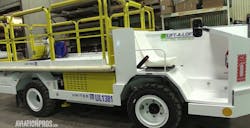NEW YORK (AP) -- In New York and other big cities, some commuters fumed Friday about Homeland Security Secretary Michael Chertoff's remarks that cities will have to pay to protect trains and buses because airplanes are a higher priority.
''I think it stinks,'' psychologist David Amarel said as he boarded the subway.
Like many New Yorkers, he said he felt the government's foreign policy makes the city a target, so the government should assume responsibility for its security.
But cities will be largely on their own when it comes to securing trains and buses, Chertoff told The Associated Press on Thursday, explaining that airplanes are a higher priority for Washington.
''Michael Chertoff is a very smart guy, but I couldn't disagree more,'' New York Mayor Michael Bloomberg said.
The free subway tabloid amNew York summed up the secretary's comments Friday: ''Pay Your Own Way,'' the headline declared over a close-up of a grim-faced Chertoff.
Chertoff told the AP on Thursday that ''A fully loaded airplane with jet fuel, a commercial airliner, has the capacity to kill 3,000 people. A bomb in a subway car may kill 30 people. When you start to think about your priorities, you're going to think about making sure you don't have a catastrophic thing first.''
New York's bus and subway system, which carries 7 million riders a day, has been the target over the years of at least two alleged attempted terrorist attacks, both of which were stopped before they could be carried out.
''It's because New York symbolizes America, in other people's eyes anyway,'' said Sayyed Nabaweyyah, a retired teacher commuting into Manhattan.
The federal government is temporarily footing the extra nearly $2 million a week New York is spending to move police officers from around the city into the transit system in the wake of the London terror attacks.
In San Francisco, Bay Area Rapid Transit spokesman Linton Johnson said officials were ''very disappointed'' and ''completely stunned'' by Chertoff's comments.
BART carries 310,000 passengers a day, nearly twice as many as the San Francisco Bay area's three major airports combined, Johnson said.
''A terrorist can affect more people on a train,'' he said. ''One fully loaded BART train holds more people than a 747.''
Washington's Metro system has an average daily ridership of 700,000 on the subways and 500,000 on buses serving the District of Columbia and its suburbs.
''Fully half of the peak period users of the Metro system are federal employees,'' Metro Board Chairman Dana Kauffman said. ''Is he saying to his own people, 'Good luck?'''
Fueling local officials' fury was the Senate approval Thursday of a $31.8 billion Homeland Security spending measure that rejected a plan to spend $1.16 billion on mass transit, favoring instead a competing $100 million proposal.
Homeland Security will pay for virtually all of New York's extra transit security costs as long as the nation's transit system remains on orange, or high, alert, police said. New York has been on high alert since shortly after the Sept. 11, 2001, attack on the World Trade Center, and the city is negotiating a deal with the Metropolitan Transportation Authority for it to assume much of the extra costs once the national alert level is lowered.
Chicago's transit system is the nation's second-largest, serving 1.5 million riders a day. Chicago Transit Authority President Frank Kruesi said he was ''shocked'' at Chertoff's comments.
''They're basically telling us what we should be doing, but they're not funding it, even though the threat is from international terrorism,'' Kruesi said.
In Boston, John McQuen, 60, who commutes by train from his home in Lexington, said the federal government ''should be part of the mix'' when it comes to protecting the nation's rail and bus system.
''The transit system certainly can't afford to do it on their own,'' he said. ''They have scarcely enough money to run the system as it is.''
But not all commuters across the country were angered by Chertoff's remarks.
Ivar Hyngstrom, 43, who rides the Metra train nearly every week to get to business meetings in Chicago from his suburban home, said he agrees that the government's focus should be on airlines.
''Airplanes can be used as a weapon, and trains can't,'' Hyngstrom said at a train station in downtown Chicago. ''I always feel safe on the train. I always feel like they're watching things closely here.''




